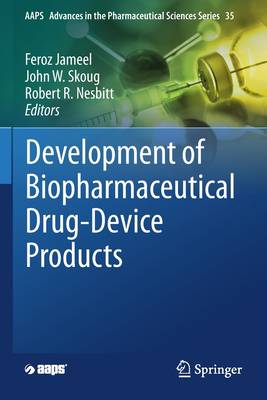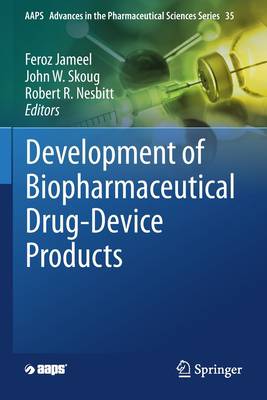
En raison d'une grêve chez bpost, votre commande pourrait être retardée. Vous avez besoin d’un livre rapidement ? Nos magasins vous accueillent à bras ouverts !
- Retrait gratuit dans votre magasin Club
- 7.000.000 titres dans notre catalogue
- Payer en toute sécurité
- Toujours un magasin près de chez vous
En raison de la grêve chez bpost, votre commande pourrait être retardée. Vous avez besoin d’un livre rapidement ? Nos magasins vous accueillent à bras ouverts !
- Retrait gratuit dans votre magasin Club
- 7.000.0000 titres dans notre catalogue
- Payer en toute sécurité
- Toujours un magasin près de chez vous
Development of Biopharmaceutical Drug-Device Products
242,95 €
+ 485 points
Description
The biotechnology/biopharmaceutical sector has tremendously grown which led to the invention of engineered antibodies such as Antibody Drug Conjugates (ADCs), Bispecific T-cell engager (BITES), Dual Variable Domain (DVD) antibodies, and fusion proteins that are currently being used as therapeutic agents for immunology, oncology and other disease conditions. Regulatory agencies have raised the bar for the development and manufacture of antibody-based products, expecting to see the use of Quality by Design (QbD) elements demonstrating an in-depth understanding of product and process based on sound science. Drug delivery systems have become an increasingly important part of the therapy and most biopharmaceuticals for self-administration are being marketed as combination products. A survey of the market indicates that there is a strong need for a new book that will provide "one stop shopping" for the latest information and knowledge of the scientific and engineering advances madeover the last few years in the area of biopharmaceutical product development. The new book entitled Development of Biopharmaceutical Drug Device Products is a reference text for scientists and engineers in the biopharmaceutical industry, academia or regulatory agencies. With insightful chapters from experts in the field, this new book reviews first principles, covers recent technological advancements and provides case studies and regulatory strategies relating to the development and manufacture of antibody-based products. It covers topics such as the importance of early preformulation studies during drug discovery to influence molecular selection for development, formulation strategies for new modalities, and the analytical techniques used to characterize them. It also addresses important considerations for later stage development such as the development of robust formulations and processes, including process engineering and modeling of manufacturing unit operations, the design of analytical comparability studies, and characterization of primary containers (pre-filled syringes and vials).Finally, the latter half of the book reviews key considerations to ensure the development and approval of a patient-centered delivery system design. This involves the evolving regulatory framework with perspectives from both the US and EU industry experts, the role of international standards, design control/risk management, human factors and its importance in the product development and regulatory approval process, as well as review of the risk-based approach to bridging between devices used in clinical trials and the to-be-marketed device. Finally, case studies are provided throughout.The typical readership would have biology and/or engineering degrees and would include researchers, scientific leaders, industry specialists and technology developers working in the biopharmaceutical field.
Spécifications
Parties prenantes
- Editeur:
Contenu
- Nombre de pages :
- 893
- Langue:
- Anglais
- Collection :
- Tome:
- n° 35
Caractéristiques
- EAN:
- 9783030314170
- Date de parution :
- 26-08-21
- Format:
- Livre broché
- Format numérique:
- Trade paperback (VS)
- Dimensions :
- 156 mm x 234 mm
- Poids :
- 1251 g

Les avis
Nous publions uniquement les avis qui respectent les conditions requises. Consultez nos conditions pour les avis.





